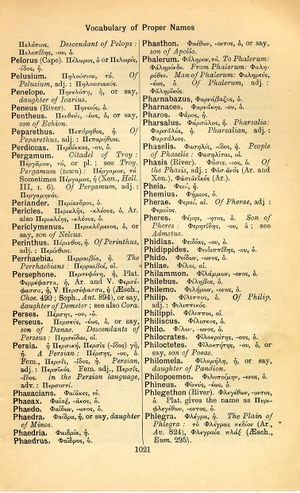Phalerum: Difference between revisions
μισῶ σοφιστὴν ὅστις οὐχ αὑτῷ σοφός → I hate the sage who recks not his own rede, I hate the sage who is not wise for himself, I hate the wise man who is not wise on his own
(6_12) |
(D_7) |
||
| Line 12: | Line 12: | ||
{{Lewis | {{Lewis | ||
|lshtext=<b>Phălērum</b>: i, n., = Φαληρόν,<br /><b>I</b> the oldest harbor of [[Athens]], [[connected]] [[with]] the [[city]] by a [[long]] [[wall]], [[with]] a [[demos]] of the [[same]] [[name]] belonging to it, Plin. 4, 7, 11, § 24.— Hence,<br /> <b>A</b> Phălēreus ([[mostly]] trisyl.), ĕi and ĕos, m., = Φαληρεύς, of or from [[Phalerum]], a Phalerian: [[Demetrius]] [[Phalereus]], or [[simply]] [[Phalereus]], a [[ruler]] of [[Athens]] and a [[famous]] [[orator]], [[about]] B. C. 300, Cic. Leg. 2, 25, 64; id. Fin. 5, 19, 54; id. Div. 2, 46, 96; Nep. Milt. 6, 4.—Scanned as a quadrisyllable: [[Demetrius]], qui [[dictus]] est [[Phalereus]], Phaedr. 5, 1, 1.—Acc.: Phalerea, Quint. 2, 4, 41; 10, 1, 80.—<br /> <b>B</b> Phălērĭcus, a, um, adj., = Φαληρικός, Phalerian: [[portus]], Nep. Them. 6, 1.—As subst.: Phălērĭcus, i, m. (sc. [[portus]]), = [[Phalerum]], in Phalericum descendere, Cic. Fin. 5, 2, 5; cf.: in Phalerico, Plin. 2, 103, 106, § 225. | |lshtext=<b>Phălērum</b>: i, n., = Φαληρόν,<br /><b>I</b> the oldest harbor of [[Athens]], [[connected]] [[with]] the [[city]] by a [[long]] [[wall]], [[with]] a [[demos]] of the [[same]] [[name]] belonging to it, Plin. 4, 7, 11, § 24.— Hence,<br /> <b>A</b> Phălēreus ([[mostly]] trisyl.), ĕi and ĕos, m., = Φαληρεύς, of or from [[Phalerum]], a Phalerian: [[Demetrius]] [[Phalereus]], or [[simply]] [[Phalereus]], a [[ruler]] of [[Athens]] and a [[famous]] [[orator]], [[about]] B. C. 300, Cic. Leg. 2, 25, 64; id. Fin. 5, 19, 54; id. Div. 2, 46, 96; Nep. Milt. 6, 4.—Scanned as a quadrisyllable: [[Demetrius]], qui [[dictus]] est [[Phalereus]], Phaedr. 5, 1, 1.—Acc.: Phalerea, Quint. 2, 4, 41; 10, 1, 80.—<br /> <b>B</b> Phălērĭcus, a, um, adj., = Φαληρικός, Phalerian: [[portus]], Nep. Them. 6, 1.—As subst.: Phălērĭcus, i, m. (sc. [[portus]]), = [[Phalerum]], in Phalericum descendere, Cic. Fin. 5, 2, 5; cf.: in Phalerico, Plin. 2, 103, 106, § 225. | ||
}} | |||
{{Gaffiot | |||
|gf=<b>Phălērum</b>, ī, n. ([[Φάληρον]]), c. [[Phalera]]. | |||
}} | }} | ||
Revision as of 07:00, 14 August 2017
English > Greek (Woodhouse)
Φάληρον, τό.
To Phalerum: Φάληρόνδε.
From Phalerum: Φαληρόθεν.
Man of Phalerum: Φαληρεύς, -έως, ὁ.
Of Phalerum, adj.: Φαληρικός.
Latin > English (Lewis & Short)
Phălērum: i, n., = Φαληρόν,
I the oldest harbor of Athens, connected with the city by a long wall, with a demos of the same name belonging to it, Plin. 4, 7, 11, § 24.— Hence,
A Phălēreus (mostly trisyl.), ĕi and ĕos, m., = Φαληρεύς, of or from Phalerum, a Phalerian: Demetrius Phalereus, or simply Phalereus, a ruler of Athens and a famous orator, about B. C. 300, Cic. Leg. 2, 25, 64; id. Fin. 5, 19, 54; id. Div. 2, 46, 96; Nep. Milt. 6, 4.—Scanned as a quadrisyllable: Demetrius, qui dictus est Phalereus, Phaedr. 5, 1, 1.—Acc.: Phalerea, Quint. 2, 4, 41; 10, 1, 80.—
B Phălērĭcus, a, um, adj., = Φαληρικός, Phalerian: portus, Nep. Them. 6, 1.—As subst.: Phălērĭcus, i, m. (sc. portus), = Phalerum, in Phalericum descendere, Cic. Fin. 5, 2, 5; cf.: in Phalerico, Plin. 2, 103, 106, § 225.

